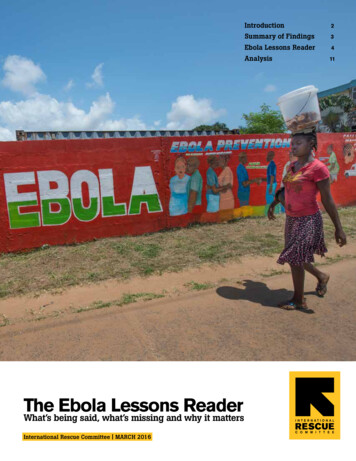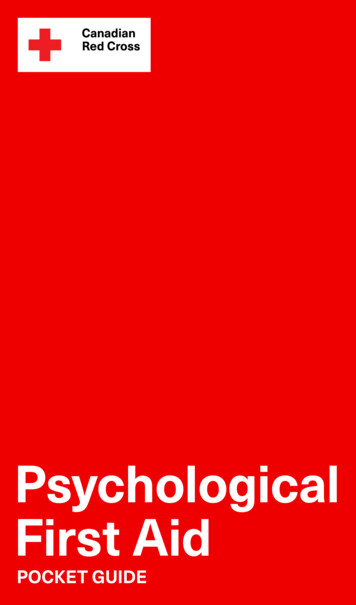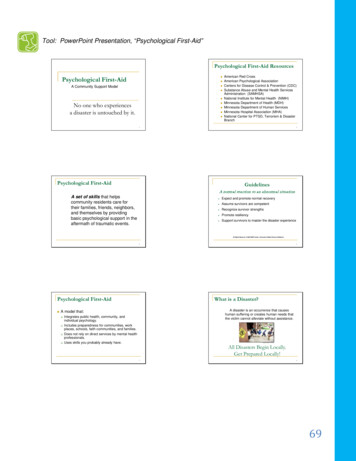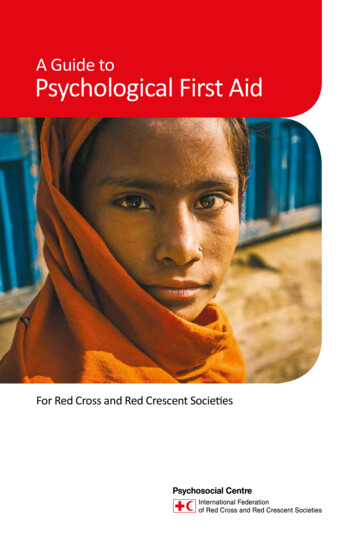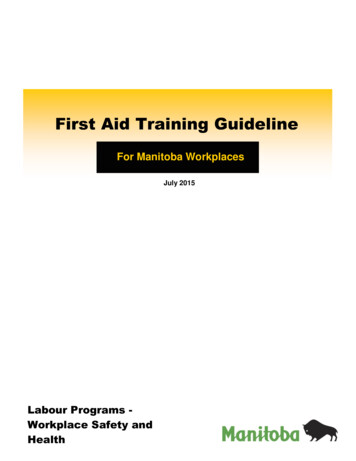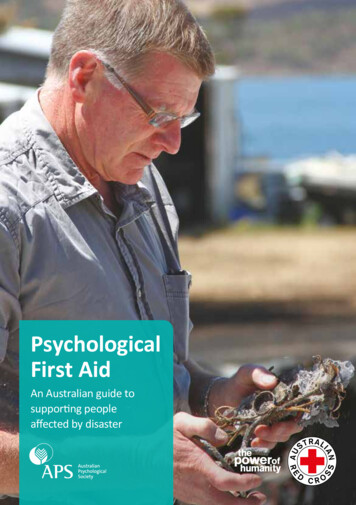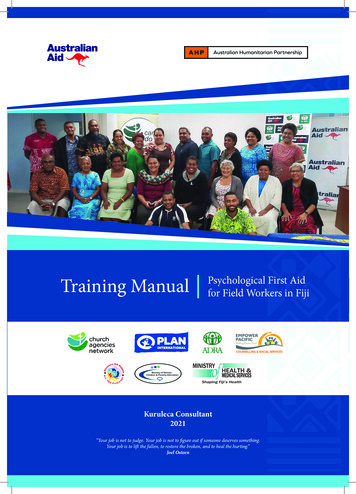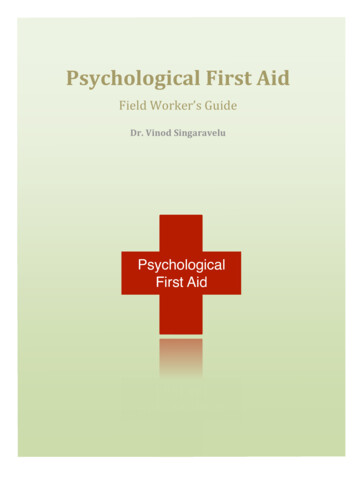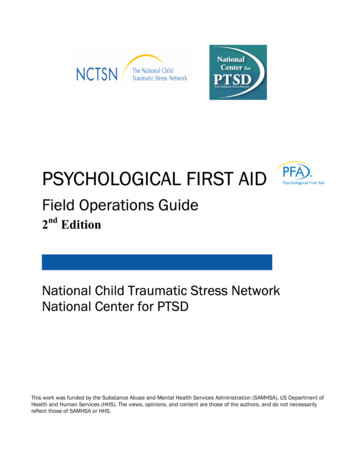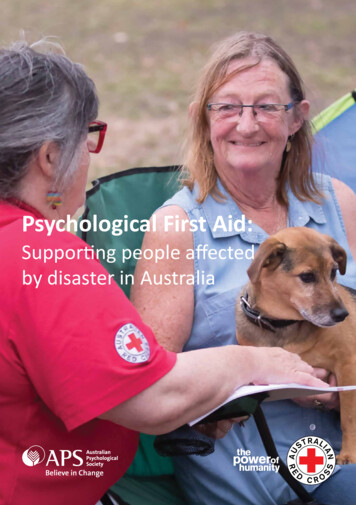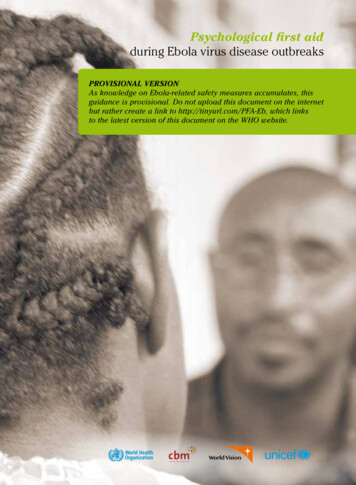
Transcription
Psychological first aidduring Ebola virus disease outbreaksProvisional versionAs knowledge on Ebola-related safety measures accumulates, thisguidance is provisional. Do not upload this document on the internetbut rather create a link to http://tinyurl.com/PFA-Eb, which linksto the latest version of this document on the WHO website.Psychological first aid during Ebola virus disease outbreaksI
WHO Library Cataloguing-in-Publication DataPsychological first aid during Ebola virus disease outbreaks.1.Crisis Intervention - methods. 2.Disease Outbreaks. 3.Haemorrhagic Fever, Ebola - psychology.4.Adaptation, Psychological. 5.First Aid - psychology. 6.Stress Disorders, Traumatic - psychology.I.World Health Organization.ISBN 978 92 4 154884 7(NLM classification: WM 401) World Health Organization 2014All rights reserved. Publications of the World Health Organization are available on the WHO website (www.who.int) or can be purchased from WHO Press, World Health Organization, 20 Avenue Appia, 1211 Geneva 27,Switzerland (tel.: 41 22 791 3264; fax: 41 22 791 4857; e-mail: bookorders@who.int).Requests for permission to reproduce or translate WHO publications –whether for sale or for non-commercialdistribution– should be addressed to WHO Press through the WHO website (www.who.int/about/licensing/copyright form/en/index.html). All reasonable precautions have been taken by the World HealthOrganization to verify the information contained in this publication. However, the published material is beingdistributed without warranty of any kind, either expressed or implied. The responsibility for the interpretationand use of the material lies with the reader. In no event shall the World Health Organization be liable fordamages arising from its use.This document is an adaptation of the Psychological first aid: Guide for field workers (World HealthOrganization, War Trauma Foundation, World Vision International, 2011) to include relevant information torespond to Ebola virus disease outbreaks.The adaptation was developed by Carmen Valle (CBM) with technical support from Leslie Snider (consultant)and Sarah Watts (WHO).Review and finalization of the document was coordinated by Mark van Ommeren (WHO) under guidancefrom Sylvie Briand (WHO) and Shekhar Saxena (WHO).This document was reviewed by Yolanda Bayugo (WHO), Margriet Blaauw (IASC Reference Group onMental Health and Psychosocial Support), Georgina Campbell (University of Makeni), Eliza Cheung (IFRC),Julian Eaton (CBM), Margaux Mathis (WHO), Thomas Moran (WHO), Carol Nader (WHO), Rafael Obregon(UNICEF), Alison Schafer (WVI), Nahoko Shindo (WHO), Saudamini Siegrist (UNICEF), Pat Omidian (WHO),Meg Riggs (WHO), Emmanuel Streel (consultant), and Saji Thomas (UNICEF).Suggested citation: World Health Organization, CBM, World Vision International & UNICEF. Psychological firstaid during Ebola virus disease outbreaks (provisional version). WHO, Geneva, September 2014.For communication and feedback, please email vanommerenm@who.int, sion.com.au or sthomas@unicef.orgPhoto CreditsCover page, pages 20 and 46: Tamsin Evans, CBM. Reprinted with permission.Photos on pages 4, 12 and 24: World Vision International. Reprinted with permission.IIPsychological first aid during Ebola virus disease outbreaks
1pfa guidePsychological first aidduring Ebola virus disease outbreaks
forewordEbola virus disease outbreaks have a significant impact on the wellbeing of thoseaffected, their family, community members and the health workers treating people withEbola.This guide focuses on psychological first aid, which involves humane, supportiveand practical help to fellow human beings suffering serious crisis events. It is written forpeople who can help others experiencing an extremely distressing event.This guide is an adaptation of the Psychological first aid: Guide for field workers (WorldHealth Organization, War Trauma Foundation, World Vision International, 2011). It hasbeen adapted to better respond to the challenges of Ebola virus disease outbreaks. Ebolaposes specific problems for affected people (e.g., stigmatization, isolation, fear, andpossible abandonment), their caregivers and responders (e.g., safety, access to updatedinformation).Psychological first aid has been recommended by many expert groups, including theInter-Agency Standing Committee (IASC) and the Sphere Project. In 2009, the WorldHealth Organization’s (WHO) mental health Gap Action Programme (mhGAP) GuidelineDevelopment Group evaluated the evidence for psychological first aid and psychologicaldebriefing. It concluded that psychological first aid, rather than psychological debriefing,should be offered to people in severe distress following recent exposure to a traumaticevent.Endorsed by many international agencies, the original Psychological First Aid Guidereflects the emerging science and international consensus on how to support people inthe immediate aftermath of extremely stressful events.2Psychological first aid during Ebola virus disease outbreaks
foreword & CONTENTSContentsIntroduction Understanding Ebola Virus Disease4Chapter 1 UNDERSTANDING PSYCHOLOGICAL FIRST AID121.1How do crisis events affect people?131.2What is Psychological First Aid?141.3Psychological First Aid: who, when and where?15Chapter 2 how to help responsibly202.1Respect safety, dignity and rights212.2Be aware of other available emergency response measures232.3Look after yourself23Chapter 3 PROVIDING PSYCHOLOGICAL FIRST AID243.1Good communication with people in distress253.2Preparing to help273.3The Action Principles of PFA: Look, Listen and Link!283.4People who likely need special attention40Chapter 4 CARING FOR YOURSELF AND YOUR COLLEAGUES464.1Getting ready to help474.2Managing stress: Healthy work and life habits484.3Rest and reflection49OFFERING PSYCHOLOGICAL FIRST AID TO GRIEVING PEOPLE50RELAXATION AND BREATHING EXERCISES52CONTACT LIST OF MENTAL HEALTH AND PSYCHOSOCIALRESOURCES IN YOUR AREA54Local Alternative Rituals for Safe Mourningafter the Death of a Person with Ebola55PSYCHOLOGICAL FIRST AID: POCKET GUIDE56Contact List of Ebola Disease Outbreak Servicesin Your Areaback coverPsychological first aid during Ebola virus disease outbreaks3
INTRODUCTIONUNDERSTANDING EBOLAVIRUS DISEASE4Psychological first aid during Ebola virus disease outbreaks
In this chapter we discuss:INTRODUCTIONA What is Ebola virus disease?B How does it spread?C How can it be prevented?A WHAT IS EBOLA VIRUS DISEASE?Ebola virus disease is a severe, infectious disease that can be fatal (the case fatality rateof the 2014 outbreak in West Africa is about 50%). However, health care substantiallyincreases a person’s chance of survival.Appropriate infection prevention and control measures in treatment centres andhospitals, at community gatherings, during burial ceremonies and at home can helpreduce the spread of the disease. You can protect yourself, your family and yourcommunity by following the advice on these measures below.Who is at risk of Ebola virus disease?A person is at risk if they have:»»»»spent time with someone sick with Ebola or;attended a funeral of someone who has recently died with symptoms of Ebola.Psychological first aid during Ebola virus disease outbreaks5
Signs, symptoms and course of illnessEbola starts suddenly with a high fever. A person with Ebola feels verytired, has a headache and aches in the body, and does not want to eat. Thetime from infection with the virus to the onset of symptoms is 2 to 21 days.The person with the Ebola virus can infect others as soon as they begin to havesymptoms.Early-stage Ebola disease may be confused with other infectious diseases (e.g., malaria)because the initial symptoms are nonspecific. These symptoms include a high fever andextreme tiredness, often accompanied by appetite loss, headache, and body pain.As the disease progresses, people begin to experience vomiting and diarrhoea.Blood in vomit or stool is seen among severely ill patients, mostly in later stages, and isoften followed by death within days.In non-fatal cases, the person may improve around days 6-11 and will no longer beinfectious.6Psychological first aid during Ebola virus disease outbreaks
INTRODUCTIONAdvice for individuals and familiesin Ebola-affected areasWhat should I do?CALL FOR HELP IMMEDIATELYEarly treatment increases the chance of survival for the person, andprevents the spread of disease to others.»»»»»»If you suspect a family member or someone in the community of having Ebola,encourage and support them in seeking appropriate medical attention in anEbola Treatment Centre.If they cannot go to the treatment centre, hospital or health post for anyreason, you should speak with your local community leader immediately orcall the Ebola Hotline for help. Health care workers or anyone who transportssick people to treatment centres should use personal protective equipmentand observe infection prevention and control measures. Personal protectiveequipment includes heavy clothing, gloves, goggles and masks.If someone in your community has recovered from Ebola, ask this person tohelp. As far as is known, once a person has recovered from Ebola, they haveimmunity against the virus.Psychological first aid during Ebola virus disease outbreaks7
While you are waiting for help you should:PROTECT YOUR FAMILY»»»»»»»»»»8Provide the sick person with their own space, separate from the rest of thefamily. Provide them with their own plate, cup, cutlery (e.g., spoon, fork),toothbrush, etc. No item should be shared with others.Only one family or community member should care for the sick person.Others should not come into contact with them.Avoid touching the sick person. All body fluids including stool, vomit,blood, breast milk, sperm, urine and sweat are dangerous and must not betouched. If you need to touch, you must wear gloves. Make sure the gloveshave no holes. You can get gloves from community helpers and health postsor from a shop. Put soiled (dirty) clothes, towels and bed linen in a plasticbag and incinerate (burn them).A person with Ebola is best cared for in a hospital or Ebola treatment centre.However, if you provide extended care for a person with Ebola in your homeyou will need personal protective equipment. Ask your local health post toprovide this. WHO does not recommend caring for a person with Ebola athome.Wash hands with soap and water or rub hands with an alcohol-based handsanitizer (community workers may be able to provide this):»» after touching the sick person or anything that belongs to the person;»» after touching a used toilet;»» after touching any blood or body fluids (e.g., faeces, vomit);»» after touching anything that could be contaminated with body fluids,even if you wore gloves; and»» after removing gloves.Psychological first aid during Ebola virus disease outbreaks
CARE FOR THE SICK»»INTRODUCTION»»Provide plenty of drinks for the sick person such as water, soup, tea or locallyavailable beverages. If possible, encourage the sick person to feed little by little,“spoon by spoon”.Give paracetamol to the person, if they are suffering from fever and pain. Do notgive aspirin or any other pain killer.DANGER SIGNSIf the patient vomits, has diarrhoea or starts to bleed, they must be transported to ahospital immediately. These are the danger signs. The patient can infect others andis at risk of dying.The patient should be moved only by health workers who have personal protectiveequipment under the guidance of local authorities.Psychological first aid during Ebola virus disease outbreaks9
B HOW DOES EBOLA VIRUS DISEASE SPREADAND HOW CAN IT BE PREVENTED?Unlike infections such as influenza or tuberculosis, Ebola is not airborne. It can be spreadonly by direct contact with the body fluids or tissues of a person who is sick with thedisease or who has died, or by contact with anything the sick or dead person has used ortouched, such as soiled (dirty) linen and clothing.Ebola is spread through:»»»»»»»»»»direct contact with an affected person’s wounds, tissues, and body fluids like stool,vomit, blood, breast milk, sperm, urine and sweat. These are dangerous and mustnot be touched;contact with an infected person’s soiled (dirty) clothing or bed linen;unsterilized injections;skin piercing instruments (e.g., syringes or needles) that have been used by aninfected person;direct physical handling of persons who have died of Ebola.Since Ebola spreads through direct contact with an infected person, those living with andcaring for a person with Ebola are at high risk of infection. Personal protective equipmentshould be used when caring for a patient at home. Appropriate infection prevention andcontrol measures are crucial to reduce the risk of infection.People with symptoms should avoid all physical contact with others.10Psychological first aid during Ebola virus disease outbreaks
»»»»»»INTRODUCTIONProtect yourself after someone has died of Ebola: avoid direct contact andimplement protective measuresPeople who have died of Ebola are still infectious, and people in direct contactwith their bodies are at risk. Do not touch or move the body of someone whohas died of Ebola. Dead bodies should be handled only by people appropriatelytrained and wearing personal protective equipment.During funerals and burial rituals, do not touch the bodies of the deceased. Seepage 55 for ideas about how to safely mourn and honour the deceased person.Wear gloves when touching a dead person’s soiled clothes, towels and bed linen,and put them in a plastic bag and incinerate (burn them). It will prevent you fromgetting infected.Information for those who have fully recovered from EbolaHealth care providers should closely monitor people recovering from Ebola, ideally usinglaboratory tests, to be sure that the virus is no longer in the person’s system. Keep in mindthe following information about people who have recovered from Ebola:»»»»»»»»»»As far as is known, the person has immunity against Ebola disease.The person can no longer infect others.The person can help the community by taking care of sick people.Men who recover from Ebola should wear a condom during sexual contact for atleast 3 months after recovery – Ebola is present in the semen up to this time.Before breastfeeding, the breast milk of women who have recovered from Ebolashould be laboratory tested.Psychological first aid during Ebola virus disease outbreaks11
chapter 1UNDERSTANDINGPSYCHOLOGICAL FIRST AID12Psychological first aid during Ebola virus disease outbreaks
In this chapter we discuss:1.1 HOW DO CRISIS EVENTS AFFECT PEOPLE?1.2 What is Psychological First Aid?1.3 PFA: WHO, WHEN AND WHERE?1.1 HOW DO CRISIS EVENTS AFFECT PEOPLE?Although these events affect everyone in some way, people can experience a wide rangeof reactions. They can feel overwhelmed, confused or very uncertain about what ishappening. They can feel fearful and anxious, or numb and detached. Some people mayhave mild reactions, whereas others may have more severe reactions. In general, howsomeone reacts depends on many factors, including:»»»»»»»»»»»»»»the nature and severity of the event;their experience with previous distressing events;the support they have in their life from others;their physical health;their personal and family history of mental health problems;their cultural background and traditions;their age (for example, children of different age groups react differently).It is also important to remember that Ebola influences how we normally provide supportto each other (e.g., by not being able to touch people) and how we cope with the death ofour loved ones (e.g., by not being able to engage in traditional burials). This can severelyworsen people’s distress.Psychological first aid during Ebola virus disease outbreaks13Chapter 1Communities can be severely affected by Ebola disease in many ways. People areseparated from their loved ones, due to illness or death. Health workers need to deal witha high workload and a lot of stress. Those associated with Ebola can be vulnerable tosocial stigma, worsening their distress and isolation. Ultimately, whole communities mayexperience the fear and suffering that disease outbreaks often cause.
Every person has strengths and abilities to help them cope with life’s challenges.However, some people are particularly vulnerable in a crisis situation and may needextra help. This includes people who may be at risk of being infected, such as thosewho have been in contact with someone sick with symptoms of Ebola (e.g., health careproviders) or people who have attended the funeral of someone who has recently died ofEbola (e.g., relatives of people with Ebola). Other vulnerable people may include thosewho need additional support because of their age (children and the elderly), becausethey have a mental or physical disability, or because they belong to marginalized groups(including migrants). Children whose parents died of the disease, and Ebola survivors,may be stigmatised and rejected by their communities. Therefore, they may not receivethe support they need.See section 3.4 for guidance in helping vulnerable people.1.2 WHAT IS PSYCHOLOGICAL FIRST AID?According to the Sphere Project (2011) and IASC (2007), Psychological First Aid (PFA)describes a humane, supportive response to someone who is suffering and may needsupport. PFA involves:»»»»»»»»»»»»»»14providing non-intrusive, practical care and support;assessing needs and concerns;helping people to address basic needs (food and water, information);listening to people, but not pressuring them to talk;comforting people and helping them to feel calm;helping people connect to information, services and social supports;»» In the case of Ebola disease, information is vital: those providing PFA can helpto dispel myths, share clear messages about healthy behaviour and improvepeople’s understanding of the disease;protecting people from further harm (see also section 3.4 on people who likelyneed special attention).Psychological first aid during Ebola virus disease outbreaks
It is also important to understand what PFA is not:»»»»»»»»»»Overall, PFA involves helping people to:»»»»»»1feel safe, connected to others, calm and hopeful;have access to social, physical and emotional support; andfeel able to help themselves, as individuals and communities.WHO (2010) and Sphere (2011) describe psychological debriefing as promoting ventilation by asking a person tobriefly but systematically recount their perceptions, thoughts and emotional reactions during a recent stressful event.This intervention is not recommended. This is distinct from routine operational debriefing of aid workers used by someorganizations at the end of a mission or work task.Psychological first aid during Ebola virus disease outbreaks15Chapter 1It is not something that only professionals can do.It is not professional counselling.It does not necessarily involve a detailed discussion of the event that caused thedistress (as in “psychological debriefing”1).It is not asking someone to analyse what happened to them or to put time andevents in order.It is not about pressuring people to tell you their feelings and reactions to an event,but rather being available to listen to people.
1.3 PSYCHOLOGICAL FIRST AID: WHO, WHENAND WHERE?Who can benefit from PFA?PFA is for distressed people recently exposed to a crisis event. You can help bothchildren and adults, although not everyone who experiences a crisis event will need orwant PFA. Do not force help onto people, but make yourself easily available to thosewho may want support.People who may benefit from PFA during an Ebola outbreak include distressed healthcare providers treating people with Ebola, members of the community feeling anxiousabout infection, or people experiencing distress even though they have receivedconfirmation that they do not have Ebola.However, there may be situations when someone needs much more advanced mentalhealth support. When providing PFA during a disease outbreak, it is especially importantto help people who have been exposed to the disease and/or have symptoms to accessimmediate medical attention. Know your limits and get help from others, such as healthpersonnel (including, where relevant and available, mental health nurses and cliniciansin district hospitals), your colleagues, local authorities, or community and religiousleaders.16Psychological first aid during Ebola virus disease outbreaks
People who need more than PFA in terms of mental health support include:»»»»»»people who are so upset that they cannot care for themselves or their children;people at risk of hurting themselves;people at risk of hurting others.»»»»»»people who have recovered from Ebola;health care providers treating people with Ebola;frontline workers of Ebola operations (e.g., people involved in dead bodymanagement).Psychological first aid during Ebola virus disease outbreaks17Chapter 1You may also encounter people suffering in other ways as a consequence of the Eboladisease outbreak. You can offer PFA and determine if they may need further specializedsupport. This may include people who have lost multiple family members and loved onesto Ebola, particularly orphans who need extra care and protection. PFA may also beuseful for people who may be stigmatized by their communities, such as:
When is PFA provided?Although people may need access to help and support for a long time after an event, PFAis aimed at helping people who have been very recently affected by a crisis event. Youcan provide PFA when you first have contact with very distressed people. This is usuallyduring or immediately after an event. However, it may sometimes be days or weeks after,depending on how long the event lasted and how severe it was.During the Ebola outbreak, for example, PFA can be offered:»»»»»»»»»»»»18during contact tracing of people who have had contact with a person with Ebola;when delivering survival and hygiene kits to people who recovered but whoseproperties (e.g., clothing and bedding) were destroyed during disinfection of theirhome;when supporting a health care provider experiencing distress after a long shift at aclinic;when supporting a family or community that has lost someone to Ebola and issuffering because their loved one cannot be buried according to tradition;when supporting a child whose parents are in hospital, and who may be feelingconfused and sad (see section 3.4 for further advice on supporting separatedchildren and adolescents);when helping members of the community share their frustrations about travelrestrictions.Psychological first aid during Ebola virus disease outbreaks
Where is PFA provided?You can offer PFA wherever it is safe enough to do so. This is often in»»»»community settings;places where distressed people are assisted, such as health centres, shelters orcamps, and schools.When providing PFA, it is essential to respect a person’s confidentiality and dignity.Ideally, try to provide PFA where you can have some privacy to talk with the person,when appropriate and possible, while still adhering to safety precautions. This isimportant not only for confidentiality, but also to avoid the spread of panic or rumours inthe community.However, during disease outbreaks, there are limits to confidentiality because of theimportance of stopping the spread of the disease. Explain to the person that personalmatters shared with you will be kept confidential, but you are required to report to healthsurveillance teams if the person may have been exposed to Ebola and/or has symptomsof the disease. Also, some families do not want to give up the body of a loved one whohas died at home to health teams for burial. They may not understand the serious risk ofinfection for others in the house.Be gentle as you talk with people and acknowledge their fears or concerns. Explainin ways they can understand the importance of informing the authorities of suspectedcases of Ebola – to promote the health and safety of the person, their family and theircommunity. You can tell them that:»»»»»»»»early detection and supportive treatments improve the chance of survival;going to hospital to find out their disease status can help protect their family andthe community from infection;there is a high risk of infection for anyone in the house who comes in contact witha dead person’s body;there may be support measures available from the government to help peoplerecovering from the illness (e.g., government assistance and material items andservices given when a person is discharged from hospital).Psychological first aid during Ebola virus disease outbreaks19Chapter 1In the case of an Ebola (or other contagious disease) outbreak, safety from exposure tothe disease is the most important consideration in where to offer PFA – for yourself, theperson and others. This means taking all relevant precautions to prevent infection, andensuring that the appropriate medical care is offered immediately to people who havesymptoms.
Chapter 2HOW TO HELP RESPONSIBLY20Psychological first aid during Ebola virus disease outbreaks
Helping responsibly involves three main points:2.1 RESPECT SAFETY, DIGNITY AND RIGHTS2.2 BE AWARE OF OTHER EMERGENCY RESPONSE MEASURES2.3 Look after yourself2.1 Respect Safety, Dignity and RightsWhen you take on the responsibility of helping people affected by a distressing event, it isimportant to respect their safety, dignity and rights. The following principles apply to anyperson or agency involved in a humanitarian response, including those providing PFAduring disease outbreaks.Safety:»»»»Avoid putting people at further risk of harm as a result of your actions.»» For example, avoid putting them at risk of infection by taking all necessarysafety precautions.Make sure, to the best of your ability, that the adults and children you help are safeand protect them from physical or psychological harm.»» For example, many Ebola survivors are discriminated against. Do not exposethem to further stigma. Instead, encourage them to think about how they canhelp others if they can and are willing, by perhaps taking care of sick relatives.Dignity»»Treat all people with respect. The situation in areas affected by the Ebola diseaseoutbreak will be challenging for everybody. Fear, grief and tension are likely toincrease in the community. In these difficult moments, more than ever, it is essentialto treat everybody with respect and contribute to an atmosphere of dignity for all.»» For example, helpers involved in dead body management must treat thedeceased person with dignity during the burial and ensure respect for theirsurviving family members.Psychological first aid during Ebola virus disease outbreaks21Chapter 2Respect People’s:
Rights»»»»»»Make sure people can access help fairly and without discrimination.Help people to claim their rights and access available support.Act only in the best interest of any person you encounter.Keep these principles in mind in all of your actions and with all people you encounter,whatever their age, gender or ethnic background. Consider how you would like to betreated in that situation, and treat people in the same way.»»Be honest and trustworthy.»»»»Respect people’s right tomake their own well-informeddecisions.»»»»Be aware of and set aside yourown biases and prejudices.»»»»Make it clear to people thateven if they refuse help now,they can still access help inthe future.»»»»»»»»22Respect privacy and keeppersonal details of the person’sstory confidential, if this isappropriate.Behave appropriately byconsidering the person’sculture, age and gender.»»»»»»Don’t exploit your relationshipas a helper.Don’t ask the person for anymoney or favour for helping.Don’t make false promises orgive false information.Don’t exaggerate your skills.Don’t force help on people, anddon’t be intrusive or pushy.Don’t pressure people to tell youtheir story.Don’t share personal details ofthe person’s story with others.Don’t judge the person for theiractions or feelings.Psychological first aid during Ebola virus disease outbreaks
2.2 BE AWARE OF OTHER AVAILABLEEMERGENCY RESPONSE MEASURESAn important part of offering PFA is to ensure that people have access to the correctinformation about Ebola, including what services and supports are available, and how toprotect themselves. This also involves dispelling the many myths that often arise duringfrightening disease outbreaks.Therefore, when offering PFA, it is essential to be aware of what other agencies are doing,and where and how people who may have the disease should seek help (e.g., know thecontact information for key service providers). It is also important to know and shareinformation about who is responsible for child protection, case management, fooddistribution and health care for people requiring treatment for illnesses other than Ebola.Chapter 22.3 Look after yourselfHelping responsibly means looking after your own physical and mental wellbeing.As a helper, you may also be affected by the Ebola outbreak or may have family, friendsand colleagues who are affected. It is essential to pay extra attention to your ownwellbeing and be sure that you are physically and emotionally able to help others. Takecare of yourself first, so that you can best care for others. If working in a team, also beaware of the wellbeing of your fellow helpers, and find ways to support each other. As a helper, if you begin to exhibit any symptoms of the disease,do not go to work, as you will risk spreading the disease to co-workersand the people you are trying to help. Immediately inform your agency,seek medical care and take all necessary safety precautions to preventinfecting others.See Chapter 4 for more information on looking after yourself and your colleagues.Psychological first aid during Ebola virus disease outbreaks23
Chapter 3PROVIDING PSYCHOLOGICALFIRST AID24Psycholo
This guide focuses on psychological first aid, which involves humane, supportive and practical help to fellow human beings suffering serious crisis events. It is written for people who can help others experiencing an extremely distressing event. This guide is an adaptation of the Psychological first aid: Guide for field workers (World
